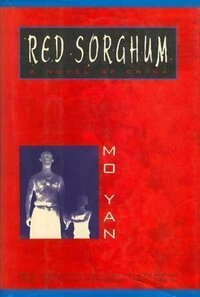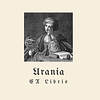Take a photo of a barcode or cover
dark
emotional
reflective
sad
tense
medium-paced
Plot or Character Driven:
A mix
Strong character development:
Yes
Loveable characters:
Yes
adventurous
emotional
tense
medium-paced
Plot or Character Driven:
Plot
Strong character development:
Complicated
Loveable characters:
Complicated
Diverse cast of characters:
Yes
Flaws of characters a main focus:
Yes
Dopo "Le Rane" questo è il mio secondo libro di Mo Yan e devo dire che è un continuo crescendo. Un romanzo epico, crudo e sensazionale che si tinge di rosso: il rosso del sorgo che scandisce la vita dei contadini, il rosso del sangue della guerra, il rosso della passione. La vita degli umili si intreccia con quella degli eroi. Storie di brigantaggio e di giustizieri. "Sorgo Rosso" riunisce in sé tematiche affini ai principali romanzi occidentali: da Verga a Scott, da Dickens a Ishiguro.
Epopea di una famiglia ai tempi dell'invasione della Cina da parte del Giappone. Violento, poetico, sanguinoso ritratto di personaggi che paiono mossi solo dai più elementari tra i sentimenti, sesso, cupidigia, gelosia, vendetta, superstizione, e che pure hanno dentro di sè la poesia di una natura che li nutre nelle più profonde fibre del loro essere.
Ed è straziante alla fine il pianto dell'ultimo discendente, che trova il sorgo rosso della sua infanzia sparito a favore di un ibrido "che allappa".
Alcune ingenuità da opera prima e alcune inutili digressioni sulla grandezza del Partito Comunista Cinese, ma si possono perdonare.
Ed è straziante alla fine il pianto dell'ultimo discendente, che trova il sorgo rosso della sua infanzia sparito a favore di un ibrido "che allappa".
Alcune ingenuità da opera prima e alcune inutili digressioni sulla grandezza del Partito Comunista Cinese, ma si possono perdonare.
challenging
dark
sad
tense
medium-paced
Plot or Character Driven:
A mix
Strong character development:
Complicated
Loveable characters:
No
Diverse cast of characters:
No
Flaws of characters a main focus:
Complicated
challenging
dark
emotional
sad
medium-paced
Graphic: Alcoholism, Child death, Death, Drug use, Gore, Infidelity, Rape, Sexual assault, Sexual content, Suicide, Torture, Blood, Vomit, Death of parent, Murder, Colonisation, War
adventurous
challenging
dark
emotional
tense
medium-paced
Plot or Character Driven:
A mix
Strong character development:
Yes
Loveable characters:
No
Diverse cast of characters:
No
Flaws of characters a main focus:
Yes
Well-written, haunting, plenty of new perspectives. Except I hated it. I would never ever ever have finished it had not been on audio. I have acquainted myself with the depth of human evil in this book. Atrocities are described in great detail. Usually such books give you some little thing to cling to, some flowering plant in the desolation of human waste. Not so here. There is only misery, survival for some and death for most.
The narrator is the grand child of one of the main characters. Most of the book is about the Japanese invasion during the second world war. There is a separation of time lines which was occasionally confusing since I had it on audio. After a while I did not care anymore. If this is all we are, monsters, we may as well go and kill ourselves now, and spare the future of our maggotridden souls. But I suppose war brings out the worst in people, the author says as much. Frankly, I would rather not dwell on it. Although I have an affinity for horror, there is only so much torture, blood and entrails I can stand. This book gave me enough of it to last a lifetime.
The narrator is the grand child of one of the main characters. Most of the book is about the Japanese invasion during the second world war. There is a separation of time lines which was occasionally confusing since I had it on audio. After a while I did not care anymore. If this is all we are, monsters, we may as well go and kill ourselves now, and spare the future of our maggotridden souls. But I suppose war brings out the worst in people, the author says as much. Frankly, I would rather not dwell on it. Although I have an affinity for horror, there is only so much torture, blood and entrails I can stand. This book gave me enough of it to last a lifetime.
Споро ми је ишло читање ове књиге и не могу рећи да ми се допала.
Мо Јен је овде желео да прикаже суровост јапанске окупационе војске из једног од јапанско-кинеских ратова (реч је о тридесетим и четрдесетим годинама ХХ века).
Нарација је фрагментисана, па се нелинеарно крећемо кроз простор и време и постепено склапамо ширу слику о Североисточном Гаомију и пишчевим прецима који су били учесници тих догађаја.
Иако се често описују врло драматични догађаји (битке прса у прса, спаљивање летине и села и слично), све је некако тромо, статично. Ликови су ту само да учествују у догађајима и немамо много увида у њихове психолошке профиле, што ми је такође кварило утисак.
Још једна ствар која ми је сметала јесу веома детаљни и натуралистички описи насиља и разних гадости. Не због тога што сам нешто посебно осетљив на насиље, већ због њихове репетитивности, а и нисам успео да схватим да ти описи доприносе књижевном квалитету (исти утисак сам имао и читајући "Крвави меридијан" Кормака Макартија).
Ипак, не могу рећи да Мо Јен лоше пише и да нисам добио неке значајне увиде. Солидна тројка.
Мо Јен је овде желео да прикаже суровост јапанске окупационе војске из једног од јапанско-кинеских ратова (реч је о тридесетим и четрдесетим годинама ХХ века).
Нарација је фрагментисана, па се нелинеарно крећемо кроз простор и време и постепено склапамо ширу слику о Североисточном Гаомију и пишчевим прецима који су били учесници тих догађаја.
Иако се често описују врло драматични догађаји (битке прса у прса, спаљивање летине и села и слично), све је некако тромо, статично. Ликови су ту само да учествују у догађајима и немамо много увида у њихове психолошке профиле, што ми је такође кварило утисак.
Још једна ствар која ми је сметала јесу веома детаљни и натуралистички описи насиља и разних гадости. Не због тога што сам нешто посебно осетљив на насиље, већ због њихове репетитивности, а и нисам успео да схватим да ти описи доприносе књижевном квалитету (исти утисак сам имао и читајући "Крвави меридијан" Кормака Макартија).
Ипак, не могу рећи да Мо Јен лоше пише и да нисам добио неке значајне увиде. Солидна тројка.
I miei pensieri saranno disorganici e frammentari come è stata la mia esperienza di lettura.
Mi sa che la Cina moderna ed io non ci tocchiamo proprio. A volte ci capiamo, spesso no, posso addirittura commuovermi, ma rimane una certa distanza che non mi sembra di avvertire quando leggo altre realtà asiatiche. Avrò sbagliato autori, non so, eppure quelli provati mi sembrano anche bravi (e Mo Yan mi ha fatto una più che buona impressione). Però... io l'ho capito il libro? A conti fatti forse soltanto un po'.
Di quello che ho letto, mi è interessato un 50% molto, un 50% per niente, e quindi ecco il mio resoconto assolutamente spiazzante ed inutile di queste montagne russe durate un mese.
Mi sa che la Cina moderna ed io non ci tocchiamo proprio. A volte ci capiamo, spesso no, posso addirittura commuovermi, ma rimane una certa distanza che non mi sembra di avvertire quando leggo altre realtà asiatiche. Avrò sbagliato autori, non so, eppure quelli provati mi sembrano anche bravi (e Mo Yan mi ha fatto una più che buona impressione). Però... io l'ho capito il libro? A conti fatti forse soltanto un po'.
Di quello che ho letto, mi è interessato un 50% molto, un 50% per niente, e quindi ecco il mio resoconto assolutamente spiazzante ed inutile di queste montagne russe durate un mese.
DNF - I tried, but it gets increasingly violent and graphic towards the end. Not to say that any of this violence was gratuitous. It is, of course, a novel portraying the Japanese occupation of China. Such violence was reality. However, it is just not what I wanted to continue consuming. The narrative is beautifully rendered, nonetheless.







